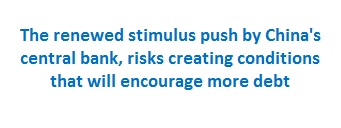Economy Report
By Andrew Smith
 There is certainly no shortage of big economic talking points this month. We have had everything from big stock market crashes and dramatic rebounds to interest rate cuts. It is difficult for even the most seasoned financial observers to get their head around the volatility that we have witnessed within such a short period of time. There are some encouraging signs here and there, but on the whole it is starting to look like the second half of the year will be much bleaker than most analysts had predicted and definitely much more than the Chinese authorities will have been hoping for. Cathy Holcombe of the South China Morning Post has observed that, "This year China data scepticism seems to be at fever pitch. After all, the construction boom has faded, the corporate sector is deleveraging, electricity output is anaemic, and heavily indebted provinces are resisting Beijing's calls for more fiscal activism. Where exactly is the growth coming from?"
There is certainly no shortage of big economic talking points this month. We have had everything from big stock market crashes and dramatic rebounds to interest rate cuts. It is difficult for even the most seasoned financial observers to get their head around the volatility that we have witnessed within such a short period of time. There are some encouraging signs here and there, but on the whole it is starting to look like the second half of the year will be much bleaker than most analysts had predicted and definitely much more than the Chinese authorities will have been hoping for. Cathy Holcombe of the South China Morning Post has observed that, "This year China data scepticism seems to be at fever pitch. After all, the construction boom has faded, the corporate sector is deleveraging, electricity output is anaemic, and heavily indebted provinces are resisting Beijing's calls for more fiscal activism. Where exactly is the growth coming from?"
The official GDP target, which was announced by the country's leaders early in the year, is of course 7%. Last month Chinese President Xi Jinping spoke about his nation's macroeconomic outlook when he met with provincial officials in the northern province of Jilin. He said that on the whole the economic outlook still looks promising due to the fact that the fundamentals are still pretty sound and the country is moving towards a so called "new normal." Although there are plenty of doubters, the Chinese leader isn't alone in his optimism for China's prospects. In the World Bank's view, "China's economy is strong and its fundamentals are sound."
Micheal Ivanovich of MSI Global believes that, "China's economy will continue to grow at a steady and sustained pace amid slow and cautious reforms of its financial system and the sprawling state-owned companies. Accidents, such as the recent equity market turmoil, will be part of that process, but that is unlikely to derail this unique example of a command economy with an increasingly expanding private sector." We will have to wait and see whether the new normal means 6-7% or something more in line with what developed economies would consider to be a fairly healthy rate of growth (2-3%).
If the GDP growth targets are not achieved this year then there will no doubt be plenty of commentators jumping back on the hard landing bandwagon. Yet in actual fact it wouldn't necessarily mean that the world's second largest economy is about to enter a financial crisis or a major slowdown. Although it is still early days the reforms agenda seems to have been successful in promoting higher quality growth. A major problem however is the fact that Chinese growth is still very much driven by both exports and government investment. The European situation, particularly now that Greece is on the verge of a dramatic exit from the single currency, is always going to provide a substantial drag on external demand, and thus inevitably lead to slower growth in the Middle Kingdom. Until the developed world gets its act together then export-led growth is unlikely to be a viable option for Chinese policymakers.
 The investment side of things is also increasingly becoming a big cause for concern. Recently there has been some intriguing but undoubtedly controversial data released relating to the ongoing debt burden. According to a report by Thomson Reuters, the Chinese debt to GDP ratio now stands at around 160%, making it almost twice as large as the of the United States. Credit-ratings agency Standard and Poor estimate that over the next years the current debt burden will increase by another 77%.
The investment side of things is also increasingly becoming a big cause for concern. Recently there has been some intriguing but undoubtedly controversial data released relating to the ongoing debt burden. According to a report by Thomson Reuters, the Chinese debt to GDP ratio now stands at around 160%, making it almost twice as large as the of the United States. Credit-ratings agency Standard and Poor estimate that over the next years the current debt burden will increase by another 77%.
Given the amount of credit given to the financial sector and local governments over the last decade or so it is hardly a surprise that public, private and corporate debt has crept up to such high levels. As Business Insider's David Scutt points out, "Having delivered four rate cuts and three reserve-ratio requirement reductions and implementing debt-swap facilities to reduce financing costs for local government authorities in the past nine months, the renewed stimulus push by China's central bank, the People's Bank of China, risks creating conditions that will encourage more debt to be taken on, potentially increasing risks of instability in China's financial system." Bo Zhuang, a Chinese economist at the London research firm Trusted Sources, says the rise in private-sector indebtedness is, "quite an alarming issue. The government is trying very hard to slow down the pace of the leveraging up, but they are not deleveraging. The debt-to-GDP ratio will continue to go up."
 An article in Singapore based publication Today highlighted the fact that, "Beijing's policy interventions affecting corporate credit have been mostly designed to address a different goal â supporting economic growth, which is set to fall to a 25-year low this year. It has cut interest rates four times since November, reduced the level of reserves banks must hold, and removed limits on how much of their deposits they can lend." Moreover, the author claimed that, "China's banks made 1.28 trillion CNY in new loans last month, up from May's 900.8 billion CNY. The effect of policy easing has been to reduce short-term interest costs, so lending for stock speculation has boomed, but there is little proof that loans are being used for profitable investment in the real economy. Manufacturers' debts are increasingly dwarfing profits."
An article in Singapore based publication Today highlighted the fact that, "Beijing's policy interventions affecting corporate credit have been mostly designed to address a different goal â supporting economic growth, which is set to fall to a 25-year low this year. It has cut interest rates four times since November, reduced the level of reserves banks must hold, and removed limits on how much of their deposits they can lend." Moreover, the author claimed that, "China's banks made 1.28 trillion CNY in new loans last month, up from May's 900.8 billion CNY. The effect of policy easing has been to reduce short-term interest costs, so lending for stock speculation has boomed, but there is little proof that loans are being used for profitable investment in the real economy. Manufacturers' debts are increasingly dwarfing profits."
The recent stock market correction â which shaved more than 30% of the indexes value-obviously shook everyone up and provided plenty of food for thought. While it has been a long time coming it still took a few people by surprise, not least the central bank who, rumour has it, has been taking action to prop up the market and reassure investors that China is a safe place to park their money. However, neither the bursting of the stock market or real estate bubble is potentially as catastrophic as a failure to get the credit situation under control. "Managing the debt market is probably more dangerous than the stock market as the scale of the debt market is bigger and ... the moral hazard is a significant issue," said Bank of America Merrill Lynch analyst David Cui.
--END--